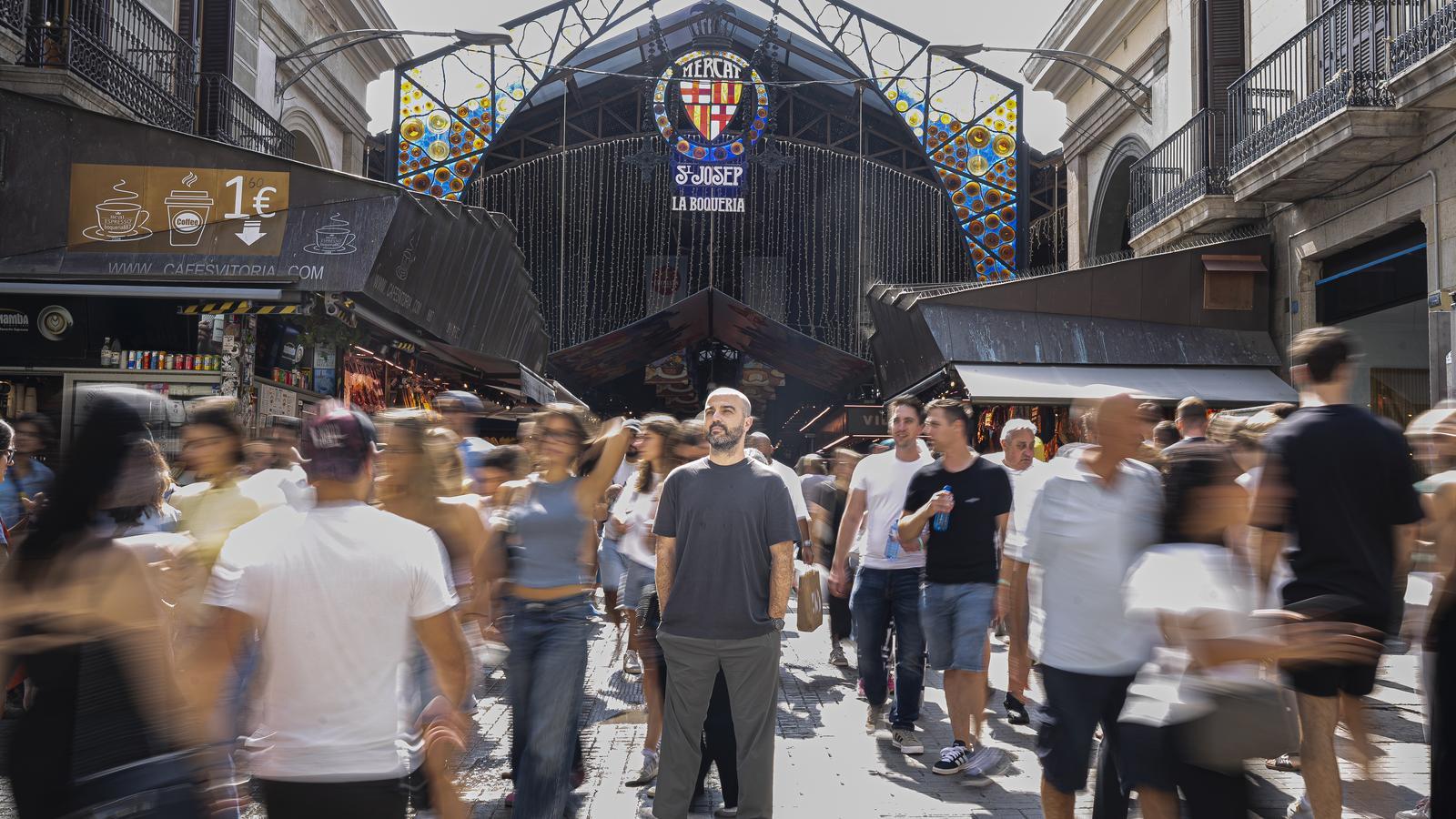Marc Casanovas: "It says very little about our society that so many people don't know who Ramon Cabau was."
Author of A Gastronomic Opera: The Life and Death of Ramon Cabau, Soul of La Boqueria


BarcelonaRamon Cabau (Lleida, 1924 – Barcelona, 1987) was one of the world's most important restaurateurs and met a tragic end. He committed suicide in La Boquería, which he considered his home, by ingesting cyanide. When journalist Marc Casanovas Anguera discovered the figure of this pharmacist, public relations expert, farmer, chameleon, visionary, charismatic, womanizer, media figure, elegant, and a host of other adjectives, he realized there wasn't much information about him and was shocked. This is how the book was born. A gastronomic opera. The life and death of Ramon Cabau, the soul of La Boqueria. (Ara Llibres), which will be presented at the Finestres bookstore this Monday, September 8, at 7 p.m.
Who was Ramon Cabau and why do you think he deserved a book?
— I'll be honest, I didn't know Ramon Cabau. And it says very little about our society that so many people don't know who Ramon Cabau was. After writing a first book [I'm not one of them[Ara Llibres] and from speaking with Llorenç Petràs and Àlex Montiel, I'm familiar with him. Then I go to Google to see how many books have been written, and I find that there's absolutely nothing. I put him on a par with the great celebrated figures of Barcelona, such as Gaudí, Miró, Carmen Amaya, Montserrat Caballé, or Mercè Rodoreda.
What did Cabau do?
— It's key to understanding why Barcelona has such international relevance with such a current discourse, even though it was at odds with everything back then. He believed blindly in seasonality and local produce, traveled extensively, and was deeply curious about gastronomy, eager to apply all the knowledge he acquired to his own products. He strongly believed in going to the market at all costs. And then he was quite a character and had many problems and conflicts.
He committed suicide in 1987, which has made it difficult for you to find sources...
— Many of the testimonies from personal friends are great. I remember organizing the interviews almost by age, because of this feeling of unease that, I hate to say it like this, no one would die on me. And that's what happened to me with the case of Montse Guillén.
You've also had to look through a lot of newspaper archives.
— Yes, and it's very sad to have to go to Madrid to find all the information we don't have about Cabau in Catalonia. There's more information in the National Library of Spain than in all of Catalonia.
He was a reference for his contemporaries.
— Isidro Gironès He told me that he considers him his ideological father. How he defended our cuisine. In '76 or '77, the debate in the media was about whether Catalan cuisine existed. Not what it was, no. Yes, it existed! Well, this man defended it to the death.
His restaurant, Agut d'Avignon, which he opened after a fight with his father-in-law, the owner of Agut, was considered the best restaurant in Spain. But he couldn't make an egg...
— He understood that gastronomy could be a great engine of change, but also, from a young age, he knew how to connect with power. He immediately saw that to have a good restaurant you also need to have good connections. He understood the importance of being a public figure in gastronomy. It was something truly revolutionary in Catalonia. He became friends with everyone and ended up becoming a relative of Néstor Luján [Luján married his stepdaughter Tin]. This proximity he had to power immediately made them all sit at the table and they fell in love with him. When he appeared on TV, he had the ability to fill the screen by himself.
Cabau built a character and ended up being a celebrity.
— He had that kind of aura. He only touched the produce at La Boqueria, but he didn't touch any money. Afterward, his right hand went to pay. It was like, "I don't get my hands dirty with money or food, but I'm the best shopper and the best restaurateur." In other words, he was somewhat above good and evil. He was elegant, he had that dandyish, divine quality that later got him into trouble. He was like the Great Gatsby in Catalan.
Was the reason you didn't like butifarra with beans because you found it too mundane?
— Whenever he spoke in Catalonia, everyone talked about butifarra with beans, and he couldn't stand it. He believed that a thousand dishes should be talked about before this one. Just like bread with tomato. He said that bread with tomato should be eaten at home, not in a restaurant.
I found their pricing policy curious. They made expensive products cheap and cheap products expensive.
— I've found statements from journalists who came from Madrid who said it was a cheap restaurant where you could eat luxurious food. For people in Barcelona, it was a very expensive restaurant. He wanted a certain distinction in his dining room. I'm surprised it was so successful, that there were lines every day. Isidre Gironès told me that Cabau was magnificent at speaking to the press and going out. Restaurants didn't go out to the press back then, and he was always going out. He was a super-media personality, who made refrigerator commercials on television. He told lies in public, like the little bows were made from his lovers' dresses. Years later, he himself, laughing, says that this was something he said to increase the popularity of his public image.
In the book, you talk about great culinary icons, like Josep Mercader and Josep Lladonosa. Do you think we've been unfair to our icons?
— No, we haven't. We haven't been since the general amnesia we have in that country. It can't be that in the culinary world it seems like everything started with the emergence of El Bulli. A country without good biographies isn't, and never will be, a country. Not all Catalan media figures come from nowhere; there were people who paved the way. Many interviewees had the feeling that absolutely no one remembers them. And then you ask yourself: how many more Cabaus do we have along the way who deserve recognition?
And he was a media figure.
— When Paul Newman needed someone for a salad dressing commercial, he was the one they called. His death was a phenomenon. The only thing anyone talked about was him. How could all this have evaporated?
Do you think the fact that things didn't end well with his son-in-law, Néstor Luján, contributed in some way to his media ostracism?
— It all comes together: the financial, romantic, family issues... There comes a time when, as I say in the book, you were either with the family or against the family.
You haven't been able to talk to your stepdaughters.
— They know about the publication of this book, and they know I was writing it. I wanted to meet them, but I couldn't.
His name is not inscribed on the niche in the Montjuïc cemetery where he is buried.
— It's a funny thing, to say the least.
Especially because it was very popular.
— No one could say they knew him at all. People often went to eat, more than for the food, which was good, to see him. He was super addictive. We're talking about a character for whom there should be Cabau Awards everywhere in Catalonia. He should have a docuseries or a movie.
In the book you venture to diagnose him as bipolar.
— At first, I didn't want to do it because I thought it was taking too much of a liberty, but luckily the investigation went very well; I even met the doctor who performed the autopsy. Xavier Domingo clearly states that these ups and downs caused his illness. In fact, when the Avignon Acute Hospital opened, he was confined to the asylum.
When he committed suicide he was about to sign with TV3 for what ended up being Jaume Pastallé and the Good cookingHe had lost the restaurant, but things were not going badly for him.
— By the late 1980s, Catalonia hadn't forgotten Cabau yet. He had offers. Politicians wanted him in the public eye, representing gastronomy linked to tourism. There was an attempt at revival, but all of this came together with a person who was ill and severely depressed.
Boqueria is the book's other protagonist. And Petràs says that, if Cabau were alive, he'd probably say that today's Boqueria "is shit." What do you think?
— I would love to present this book at La Boqueria. And I know it won't happen, because I think the management of La Boqueria won't take this book well. And it shouldn't. We lack critical thinking, we lack understanding that there are things that have been done wrong and can be done better, and that writing this book isn't about going against anything or anyone; it's the other way around. I think between the lines, you can clearly see the love I have for my city and the love I have for the municipal markets.
You defend the thesis that March 31, 1987, when Cabau committed suicide, was the day that La Boquería began to wither away.
— He couldn't prevent globalization or the homogenization of all cuisines... But I'm sure that La Boquería wouldn't be what it is today if he had lived 25 more years. He would have managed to protect certain things. Would fruit salads and sangrias be sold in the style of a sevillana? Surely. But he would have achieved, at least, a more humane and more Barcelona-style Boquería. Definitely.
